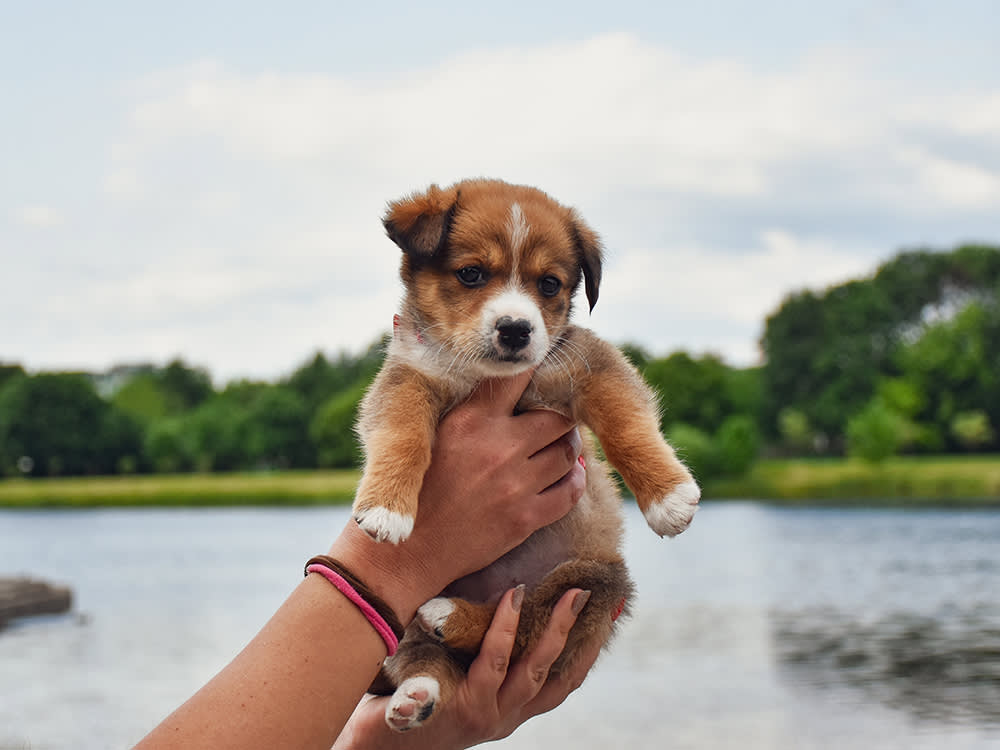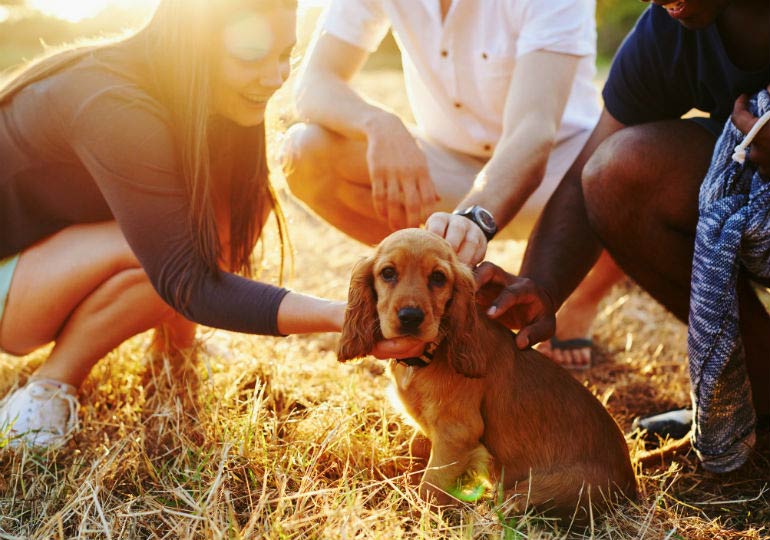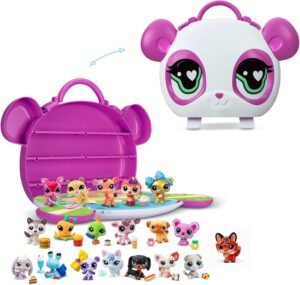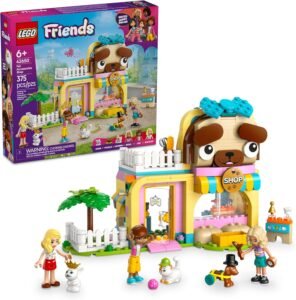Socializing your puppy is crucial for their development and overall behavior. By exposing your puppy to different people, places, sights, and sounds, you can help them become a well-rounded and confident dog.
It’s important to start socialization early and in a controlled setting, such as letting children play with your puppy under supervision. This can help them become comfortable around different people and learn how to interact appropriately. Additionally, exposing your puppy to a variety of experiences and environments can help prevent fear and anxiety later in life.
Remember, socialization is an ongoing process, so continue to expose your puppy to new situations and stimuli throughout their life.

Credit: www.akc.org
Why Is Puppy Socialization Important?
Puppy socialization is crucial for their overall development. Exposing them to new experiences, sights, sounds, and people in a controlled environment helps them become well-adjusted and confident dogs. This process should start as early as possible to ensure they grow up to be happy and sociable pets.
Introduction To Puppy Socialization
Socializing your puppy is crucial for their overall development and well-being. It involves exposing your furry friend to a variety of people, animals, environments, sounds, and experiences during those early months. This period is known as the critical socialization period, which typically occurs between 3 and 14 weeks of age.
This blog post will provide you with a comprehensive guide on how to socialize your puppy, ensuring they grow up to be confident, well-rounded, and adaptable dogs.
Benefits Of Socializing Your Puppy
1. Builds Confidence:
Proper socialization helps build your puppy’s confidence by gradually exposing them to new experiences and helping them form positive associations. This is essential for preventing fear and anxiety-related behaviors later in life.
2. Enhances Behavior:
A well-socialized puppy is more likely to exhibit friendly and appropriate behavior towards people and other animals. They learn how to communicate and interact effectively, reducing the risk of aggression or fear-based reactions.
3. Reduces Fearfulness:
Through exposure to different environments, noises, and stimuli, your puppy learns to adapt and becomes less fearful. This prevents them from developing phobias or anxiety disorders as they grow older.
4. Prepares For Future Challenges:
Socializing your puppy helps them become adaptable to various situations and environments. They are better equipped to handle changes, such as vet visits, grooming, traveling, or meeting new people and animals, throughout their lives.
5. Strengthens The Bond:
By participating actively in your puppy’s socialization process, you strengthen your bond and trust with them. This shared experience builds a foundation of mutual understanding and cooperation.
| Did You Know? |
|---|
| The critical socialization period ends around 14 weeks of age, so it is crucial to begin socializing your puppy as early as possible. |
How To Socialize Your Puppy Checklist:
- Gradually expose your puppy to different environments.
- Introduce them to a variety of people, including men, women, children, and individuals with different appearances.
- Provide positive interactions with other vaccinated and well-behaved dogs.
- Expose your puppy to various sounds like sirens, car horns, vacuum cleaners, and thunderstorms.
- Allow your puppy to walk on different surfaces, such as grass, gravel, sand, and hardwood floors.
- Encourage gentle handling and touch them in different areas, including their paws, ears, and tail.
- Expose them to different types of vehicles, bicycles, wheelchairs, and other common sights.
Remember, socialization is an ongoing process that lasts throughout your dog’s life. Keep the experiences positive and enjoyable, taking it at their pace, and always rewarding their good behavior. Soon, you’ll have a happy, well-adjusted adult dog who is confident in any situation.
When To Start Socializing Your Puppy
Socializing your puppy is a crucial step in their development to ensure they grow up to be well-adjusted and confident adult dogs. But when is the right time to start socializing your furry friend? The answer is, as soon as possible! The critical socialization period for puppies begins at around three weeks of age and extends up to around 14 weeks of age. This is the most important time to expose your puppy to as many positive experiences as possible, as it helps them develop positive associations with different people, animals, and environments.
The Critical Socialization Period
The critical socialization period is a crucial window of opportunity for your puppy’s mental and emotional development. During this period, puppies are most open to new experiences and are more likely to form positive associations. It is essential to expose your puppy to a variety of stimuli, such as different sounds, sights, smells, surfaces, and people, to ensure they grow up to be confident and well-adjusted.
The Rule Of Sevens
The Rule of Sevens is a helpful guideline to ensure you provide your puppy with a well-rounded socialization experience. According to this rule, by the time your puppy is seven weeks old, they should have:
- Been on seven different surfaces, such as carpet, tile, grass, and wood.
- Met and interacted with seven new people, including children, men, women, and individuals of different ethnicities.
- Experienced being in seven different locations, such as parks, pet stores, and busy streets.
- Played with seven different types of toys, including soft toys, squeaky toys, and interactive toys.
- Eaten from seven different containers, such as bowls, puzzle feeders, and treat-dispensing toys.
- Met and played with seven different dogs, including dogs of different sizes, breeds, and temperaments.
- Been exposed to seven different noises, such as traffic sounds, household appliances, and thunderstorms.
By following the Rule of Sevens, you are providing your puppy with a well-rounded socialization experience that prepares them for different situations and environments they may encounter throughout their lives.
Methods And Techniques For Socializing Your Puppy
Proper socialization is crucial for raising a well-rounded and confident puppy. By exposing them to a variety of experiences, you can help them develop the necessary skills to navigate the world around them. Below, we will explore three key methods and techniques for socializing your puppy.
Exposing Your Puppy To Different Environments
Introducing your puppy to various environments is essential for their development. By exposing them to different settings, such as parks, city streets, and even other people’s homes, you can help them become comfortable and adaptable. Start with quieter and less overwhelming places, gradually increasing the level of stimulation. Remember to keep outings short and positive, ensuring your puppy associates these new environments with positive experiences.
Introducing Your Puppy To New People
Socializing your puppy with new people is equally important. Encourage your friends, family, and neighbors to interact with your puppy in a calm and gentle manner. While it’s important to expose them to a variety of ages, genders, and ethnicities, ensure that all interactions are positive and stress-free. Reward your puppy for calm behavior and provide treats or praise when they respond well to new people.
Getting Your Puppy Used To Various Sounds And Textures
Help your puppy become accustomed to different sounds and textures to prevent fear or anxiety in the future. Expose them to loud noises such as vacuum cleaners, fireworks, or traffic. Gradually increase the volume level, using treats and playtime to create positive associations. Additionally, introduce your puppy to various textures like different floor surfaces, grass, carpet, or wooden floors. By doing so, you’ll help them develop confidence and adaptability in different environments.
Overall, these methods and techniques provide a solid foundation for socializing your puppy. Remember to prioritize positive experiences, use treats and praise as rewards, and go at your puppy’s pace. By investing time and effort into their socialization, you are setting them up for a lifetime of confidence and happiness.
Challenges And Solutions In Puppy Socialization
In puppy socialization, challenges may arise when introducing your puppy to new experiences, environments, and other dogs. The key solution is to start early and expose your puppy to a variety of positive experiences, people, and animals, helping them develop into well-rounded and confident adults.
Dealing With Fear And Anxiety
Socializing a puppy can sometimes come with challenges, and one common challenge is fear and anxiety. Many puppies may feel overwhelmed or scared in new environments or around unfamiliar people and animals. It’s essential to address these fears and anxieties to ensure the puppy’s socialization is successful. One solution to deal with fear and anxiety is gradual exposure. Start by introducing your puppy to new experiences in a slow and controlled manner. Let them take their time to observe and adjust to their surroundings. Gradually increase the level of exposure as they become more comfortable, always ensuring their safety. Another solution is positive reinforcement. Use treats, praise, and rewards to associate positive experiences with socialization. This will help the puppy build confidence and create positive associations with new people, animals, and environments.Addressing Aggression Towards Other Dogs
Another challenge in puppy socialization can be aggression towards other dogs. It’s important to address this issue early on to prevent it from becoming a long-term behavior problem. One solution is controlled introductions. When introducing your puppy to other dogs, do it in a neutral environment like a park. Have a family member or friend help you so that each dog can receive individual attention. This will create a safer and less territorial atmosphere for both dogs. Positive reinforcement training is also beneficial. Use treats and rewards to reinforce positive behaviors during interactions with other dogs. Encourage appropriate play and discourage aggressive behavior. Consistency and patience are key in addressing aggression and helping the puppy develop better social skills. In conclusion, understanding and addressing the challenges in puppy socialization is crucial for their overall well-being and behavior. By dealing with fear and anxiety and addressing aggression towards other dogs, you can help your puppy become a well-socialized and confident adult dog. Remember to always prioritize the safety and comfort of your puppy during the socialization process.Tips For Successful Puppy Socialization
Puppy socialization is crucial for their overall development and well-being. It helps them become confident, well-adjusted, and friendly adult dogs. Here are some tips to ensure successful puppy socialization.
Gradual Exposure And Positive Reinforcement
In order for your puppy to develop positive associations with new experiences and environments, it’s important to introduce them gradually. Start by exposing your puppy to low-stress situations and gradually increase the level of difficulty.
Positive reinforcement plays a key role in socializing your puppy. Use treats, verbal praise, and affection to reward your puppy for calm and confident behavior. This will help them associate new experiences with positive outcomes.
Utilizing Puppy Training Classes
Puppy training classes are a great way to provide structured socialization opportunities for your furry friend. These classes are usually conducted by professional trainers who can guide you and your puppy through the socialization process.
During these classes, your puppy will have the chance to interact with other puppies of similar ages. This interaction is crucial for developing good social skills and learning appropriate behavior around other dogs.
Ensuring Safe Interactions
When it comes to socializing your puppy, safety should always be a top priority. Make sure the interactions with other dogs are supervised and take place in a controlled environment.
Gradually introduce your puppy to new dogs, starting with well-socialized and friendly ones. Observe their body language and intervene if any signs of aggression or fear arise. Remember, positive experiences during interactions with other dogs will help your puppy develop healthy socialization skills.

Credit: www.thewildest.com

Credit: www.akc.org
Frequently Asked Questions Of Puppy Socialization: How To Socialize Your Puppy
How Do I Socialize My Puppy With Another Puppy?
To socialize your puppy with another puppy, have a family member or friend help during their first meeting in a park. Avoid introducing them at home or in the yard to prevent territorial behavior. Expose your puppy to new environments, people, and sounds, and allow them to interact with children and different individuals in controlled settings.
At What Age Should You Socialize A Puppy?
Socialize your puppy as early as possible. Expose them to new sights, sounds, and textures. Let them interact with children and different people in controlled settings. Socialization should start with the breeder and continue with you. Avoid introducing dogs in the house or yard to prevent territorial behavior.
What Is The Rule Of 7 Puppy Socialization?
The rule of 7 for puppy socialization is a guideline to expose puppies to various experiences before they turn 14 weeks old. It involves introducing them to 7 different types of people, places, and things, ensuring they have positive interactions to build confidence and prevent fear or aggression.
What Is The Most Important Socialization Period In Puppies?
The most important socialization period in puppies is during the early stages of their life. It is crucial to expose them to various people, places, sights, and sounds to help them become well-adjusted and confident. This socialization should start with the breeder and continue with the new owner.
Conclusion
Socializing your puppy is crucial for their overall development and well-being. By exposing them to a variety of experiences, people, and environments, you are helping them become confident and well-adjusted dogs. Remember to start early and take gradual steps to introduce them to new situations.
Positive reinforcement and patience are key in this process. By following the tips and techniques mentioned in this blog post, you can ensure that your puppy grows up to be a happy and sociable companion. So start socializing your puppy today and create a foundation for a lifetime of happiness and positive interactions.







